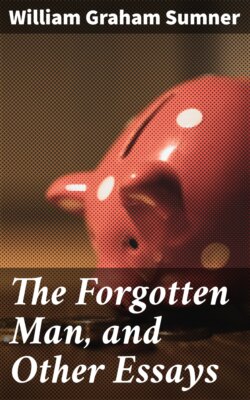Читать книгу The Forgotten Man, and Other Essays - William Graham Sumner - Страница 34
На сайте Литреса книга снята с продажи.
(B) How Taxes Do Act on Wages.
Оглавление98. If taxes are to raise wages they must be laid not on goods but on men. Let the goods be abundant and the men scarce. Then the average wages will be high, for the supply of labor will be small and the demand great. If we tax goods and not men, the supply of labor will be great, the demand will be limited, and the wages will be low. Here we see why employers of labor want a tariff. For it is an obvious inconsistency and a most grotesque satire that the same men should tell the workmen at home that the tariff makes wages high, and should go to Washington and tell Congress that they want a tariff because the wages are too high. We have found that the high wages of American laborers have independent causes and guarantees, outside of legislation. They are provided and maintained by the economic circumstances of the country. This is against the interest of those who want to hire the laborers. No device can serve their interest unless it lowers wages. From the standpoint of an employer the fortunate circumstances of the laborer become an obstacle to be overcome (§65). The laborer is too well off. Nothing can do any good which does not make him less well off. The competition which troubles the employer is not the “pauper labor” of Europe.
99. “Pauper labor” had a meaning in the first half of this century, in England, when the overseers of the poor turned over the younger portion of the occupants of the poorhouses to the owners of the new cotton factories, under contracts to teach them the trade and pay them a pittance. Of course the arrangement had shocking evils connected with it, but it was a transition arrangement. The “pauper laborers’” children, after a generation, became independent laborers; the system expired of itself, and “pauper laborer” is now a senseless jingle.
100. The competition which the employers fear is the competition of those industries in America which can pay the high wages and which keep the wages high because they do pay them. These draw the laborer away. These offer him another chance. If he had no other way of earning more than he is earning, it would be idle for him to demand more. The reason why he demands more and gets it is because he knows where he can get it, if he cannot get it where he is. If, then, he is to be brought down, the only way to do it is to destroy, or lessen the value of, his other chance. This is just what the tariff does.
101. The taxes which are laid for protection must come out of somebody. As I have shown (§§32 ff.) the protected interests give and take from each other, but, if they as a group win anything, they must win from another group, and that other group must be the industries which are not and cannot be protected. In England these were formerly manufactures and they were taxed, under the corn laws, for the benefit of agriculture. In the United States, of course, the case must be complementary and opposite. We tax agriculture and commerce to benefit manufactures. Commerce, i.e., the ship-building and carrying trade, has been crushed out of existence by the burden (§86). But the burden thus thrown on agriculture and commerce lowers the gains of those industries, lessens the attractiveness of them to the laborer, lessens the value of the laborer’s other chance, lessens the competition of other American industries with manufacturing, and so, by taking away from the blessing which God and nature have given to the American laborer, enable the man who wants to hire his services to get them at a lower rate. The effect of taxes is just the same as such a percentage taken from the fertility of the soil, the excellence of the climate, the power of tools, or the industrious habits of the people. Hence it reduces the average comfort and welfare of the population, and with that average comfort it carries down the wages of such persons as work for wages.
